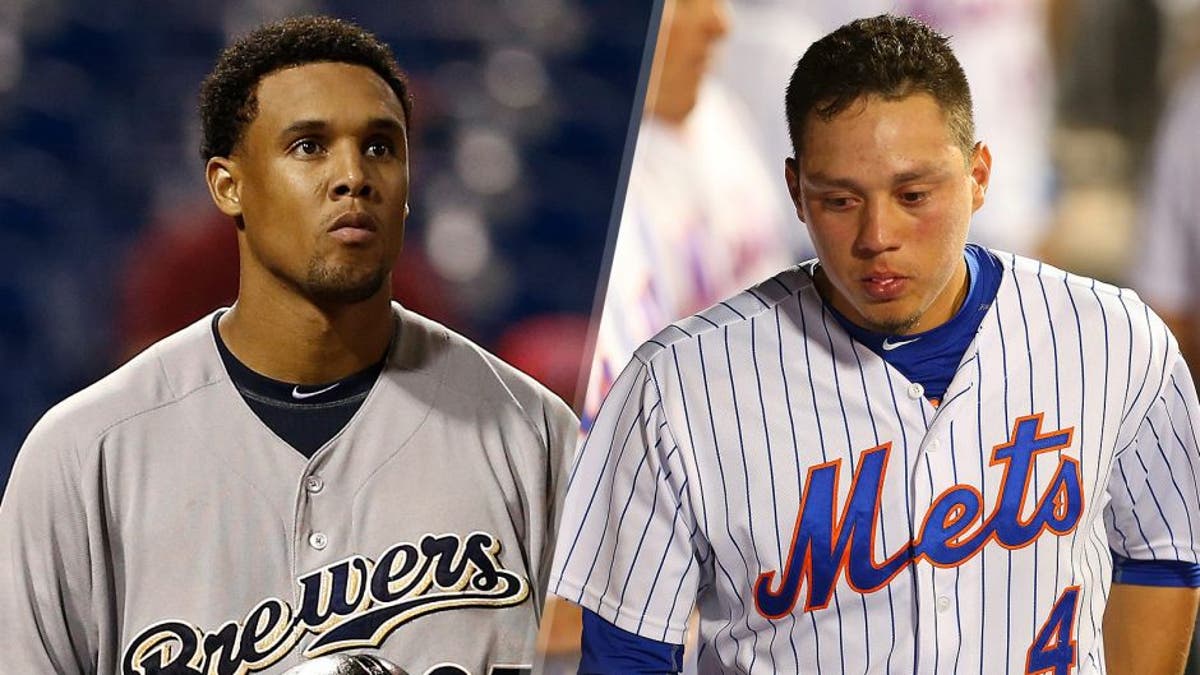
The words often are necessary in media reports of baseball transactions -- "pending a physical" for free-agent signings, or "pending a review of medical records" for trades.
The words mean that a transaction is not yet official. And every so often, a team grows concerned enough over a player's physical condition to back out of a deal completely.
This is what happened Wednesday night, when numerous reports surfaced on Twitter about a trade that would have sent outfielder Carlos Gomez from the Brewers to the Mets for right-hander Zack Wheeler and infielder Wilmer Flores.
Not all reports included a reference to "pending medicals." Even the ones that did left the impression that the deal was fait accompli. Many followers interpreted the deal as done, if only because such deals almost always get done.
Well, this deal did not get done, and the enduring image of the night was of Flores in tears at shortstop, thinking he had been traded.
The Mets looked heartless for allowing Flores to remain in the game; players involved in pending deals generally are removed to ensure that they avoid injury.
The media, too, looked heartless, at least in the view of some on Twitter; we reported a trade before it technically was completed, and created a mess.
Well, the reports were accurate, at least the ones that included the qualifier about the pending medical reviews. The teams indeed had agreed upon the players. But a problem surfaced in one of the player's medicals -- sources told Fox Sports that the Mets backed out due to concern over a hip issue with Gomez, an issue that his agent, Scott Boras, says does not exist.
Was Mets general manager Sandy Alderson correct in saying, "Unfortunately, social media got ahead of the facts and it may have had an adverse effect for one of the players involved?" No, the facts in most reports were correct.
But could we done have a better job explaining that the trade needed to pass an important barrier before completion? Yes, even though it turns out that the player seemingly at risk -- Wheeler, recovering from Tommy John surgery -- was not the one who raised a red flag.
A 140-character tweet offers little room for context, but I'm not sure context was the problem Wednesday night; the problem was more of portrayal, of creating an opportunity for misinterpretation.
Fans ask me all the time: Why are reporters so obsessed with being first? Easy answer -- it's what we're trained to do. But while the competition pushes us, and ultimately leads to sharper coverage, we are also trained to be accurate. And by accurate, I'm talking not just about the facts, but also about context.
If someone asks, "Do you want to be first, or do you want to be accurate?" my answer is that I want to be both. I chuckle when followers say, "We don't care who is first; we just want the information." Uh, no, you want the information quickly, or why bother following?
That said, what happened Wednesday night pained me. The rat race for every last detail in a transaction bothers me. The belief among some youngsters that breaking a minor-league free-agent signing amounts to fine journalism drives me absolutely nuts.
I like certain things about Twitter -- the immediacy, the ability to interact with readers, the checks and balance that those interactions provide. But I don't like what Twitter has done to sports journalism, how it has effectively lowered our standards.
When I started in newspapers, back in the mid-1980s, I lived in fear of making a mistake, fear that botching facts would get me fired. I haven't lost that fear, and still beat myself up if I get even the smallest piece of information wrong. But honestly, I'm not sure most people care.
The ethos of Twitter -- and of aggregate sites such as MLBTradeRumors.com. -- is, "Give me the next one." That's not on us; it's on everyone out there who demands the next sliver of information, no matter how germane. Our job is to avoid falling into that trap.
At times, we do it better than others, and by and large baseball reporting is pretty darned good. Like journalists who report on other industries, our goals do not always align with the people we cover. It's quite uncomfortable to report, for example, on a free agent who flunks his physical, knowing it will affect his value. But news is news.
The trade agreement Wednesday night was news. The collapse of the deal was news. This is the world we live in today; Twitter provides the opportunity for journalists to give almost a minute-by-minute account of events as they transpire.
It isn't always pretty. It isn't always clean. But for better or worse, there's no turning back.








































